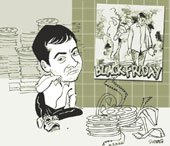 |
When he made a smashing debut as a scriptwriter with Ram Gopal Varma?s violent but hit gangster film, Bollywood?s circle of strugglers called him Anurag ?Satya? Kashyap. Six years, two incomplete and two unreleased films later, Bollywood now refers to the young director as Anurag ?Jinxed? Kashyap. The cruel joke going around in Mumbai?s film factory is that Kashyap is one film-maker who is forever trying to make his debut.
Jinx can be a huge factor in superstitious Bollywood. Life can be really tough in an industry which only prostrates before the Goddess of Success and where, if labelled unlucky, the Messrs Moneybags don?t touch you with a bargepole.
Kashyap, after struggling hard for five years despite his three well-scripted films, knows what the four-letter word portends. Always dogged by bad luck, he is now faced with a high court ruling deferring the release of his latest film, Black Friday ? on the March 12, 1993, bomb blasts of Mumbai.
?I know what it is to be tagged a jinxed director. You are treated like an untouchable,? says Kashyap, his voice low, and the excitement of a release replaced by the numbing fatigue of managing a legal tangle.
The 32-year-old director is perturbed by the twist life has taken which seems straight out of the tightly woven crime-based thrillers he is known to write. Barely two weeks ago, he was set to release his film nationwide. The reviews were encouraging, the music was being appreciated, pre-release publicity was building up, and it looked like Kashyap had broken the jinx. Then out of the blue, just days before the January 28 release, an undertrial in the serial blasts case objected to the release, and set off a chain of legal problems for the film.
Special Tada court judge P.D. Kode questioned how Black Friday could claim to be a true story when he had not penned his final verdict on the case. Kode, who is likely to pronounce his judgement any day now, however, allowed the scheduled release of the film after Kashyap agreed to remove the words ?true story? from the publicity blitz.
But, there was more. Over 36 undertrials of the case filed a petition in the Mumbai high court, urging it to stall the release of the film on the grounds that it would adversely affect the final judgement of the case. After ordering a stay on the film, the court on Thursday decided to view the film before it reached a conclusion, and asked the central government and the censor board, which had cleared the film without any major cuts, to present their view.
For Kashyap and his bunch of talented actors and technicians, what?s at stake is not just a few crore rupees, but their creative careers and the hard work they put in to give a crime reporter?s book a touch of realism. Realism is what Kashyap is obsessed with ? and realism has also proven to be his biggest hurdle.
In 2002, Kashyap made Paanch, a film about a five-member rock band which struggles to make it big in the music world, and ends up committing a crime. The film was loosely based on the sensational Abhyan-kar murder case which shocked Pune and Mumbai in the Eighties when five educated young men killed a family in cold blood for the thrills of committing murder.
Paanch ran into trouble with the censor board for its graphic violence and cuss words. The censors finally cleared the film, but not before Kashyap developed differences with the producer. Paanch never hit the multiplex marquee.
Before Paanch, Kashyap was already a successful scriptwriter. One of the earliest young wannabes in Ram Gopal Varma?s film factory, he had co-written Satya with actor Saurabh Shukla and scripted Varma productions like Shool and Kaun.
But unlike Kashyap, his mentor Varma was smart enough to base his films on real life, while taking adequate liberties to hinge the plot between fact and fiction. Not surprisingly, Varma managed to make Company, based on the lives of powerful underworld dons Dawood Ibrahim and Chhota Rajan and top cop D. Sivanandhan, without getting into trouble with either the underworld or the police.
Clearly, in Bollywood, realism rules only when it is suitably cloaked. Kashyap?s Black Friday ran headlong into legal trouble for being too real. It uses real identities and works like a docu-drama while presenting facts of the case from police files. ?How can a film which uses real identities be released when the verdict of the case is awaited?? says lawyer Majeed Memon, who represents the largest group of undertrials in the blasts case.
Kashyap argues that his film stays true to the book written by journalist S. Hussain Zaidi. ?The book was published more than two years ago. Nobody objected to the book,? he says.
For Kashyap, Black Friday?s stalled release is familiar territory. In 1993, when he arrived in Mumbai nursing a broken heart, and a burning desire to create good cinema, he saw Bollywood at its worst. Varma gave him his first break with Satya, but several other projects ? including Allwyn Kalicharan, Gulal and Paanch ? failed to take off. But despite everything, he stayed away from Bollywood?s formula fare ? even walking out out of Vidhu Vinod Chopra?s Mission Kashmir when script changes were ordered to suit Hrithik Roshan?s character.
?Sometimes it feels that the system is conspiring against you to make you do exactly what you are trying to fight against,? says the director, who also had plans to convert Black Friday into a TV series with Sanjay Dutt playing himself.
But Kashyap is not giving up hope. After all, jinxes, like promises, are made to be broken.










